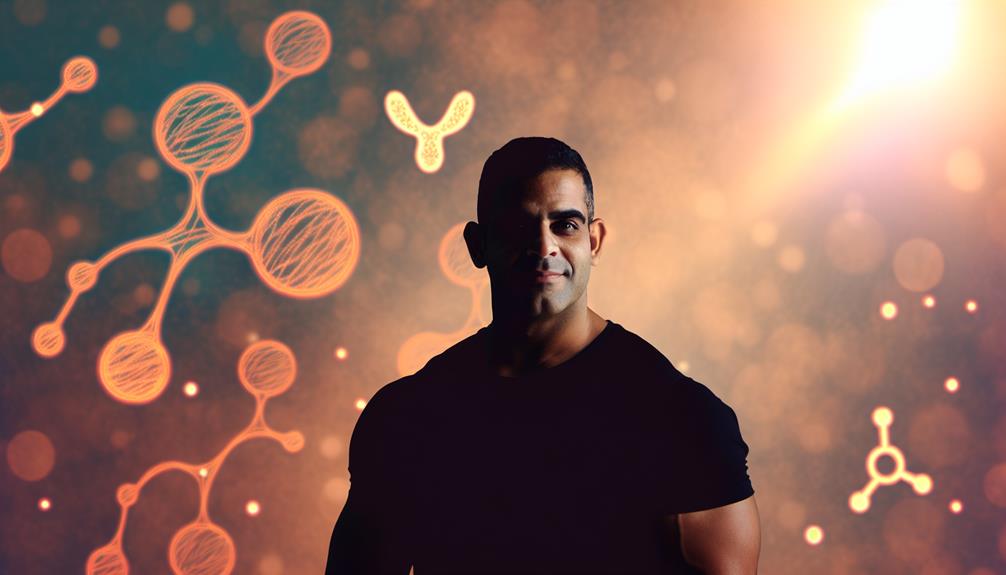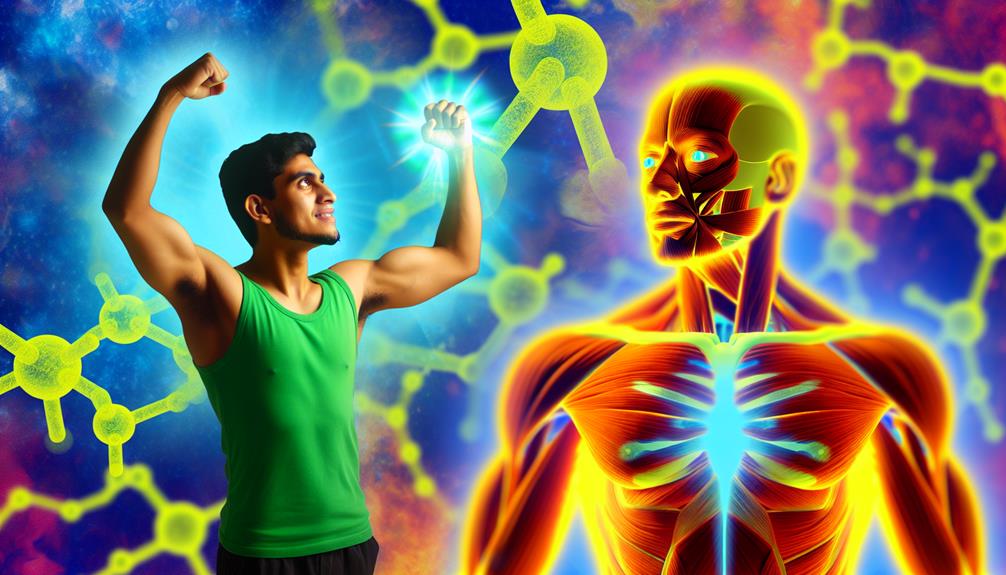In men, key hormones that are regulated include testosterone, cortisol, estrogen, DHEA, insulin, thyroid hormones, growth hormone, and prolactin. Testosterone is important for muscle mass and mood regulation, while cortisol manages stress response but can inhibit testosterone when elevated. Estrogen helps maintain bone density, and DHEA supports testosterone production. Insulin impacts glucose metabolism, and thyroid hormones regulate metabolic functions. Growth hormone is essential for well-being and muscle maintenance, and prolactin influences reproductive health. Each of these hormones plays a significant role in overall health, whose intricate balance merits further exploration for greater understanding.
Testosterone Overview

Testosterone, often referred to as the male sex hormone, plays an essential role in various physiological processes within the male body. It's primarily produced in the testes, and its levels can fluctuate due to a range of factors, including age, lifestyle, and health conditions. I've often found that understanding testosterone production is key to grasping its importance in male health.
As men age, testosterone levels typically begin to decline, which can lead to significant changes in physical and emotional well-being. This decline can adversely affect muscle mass, bone density, and even mood. The benefits of maintaining healthy testosterone levels are considerable. Increased testosterone production is linked to improved muscle strength, enhanced libido, and better cognitive function. Additionally, adequate testosterone levels contribute to a healthy metabolism, helping in weight management.
Moreover, testosterone plays a critical role in the development of male secondary sexual characteristics, such as facial hair and a deeper voice. It's not just about physical attributes; the psychological effects are equally remarkable. Many studies indicate that ideal testosterone levels can enhance mood and overall quality of life.
Role of Cortisol
While maintaining healthy testosterone levels is essential, another hormone that greatly impacts male health is cortisol. This steroid hormone, produced by the adrenal glands, plays a vital role in the body's stress response. When faced with stressors—be it physical, emotional, or environmental—cortisol is released to help manage the situation, mobilizing energy and modulating various bodily functions.
Cortisol effects are multifaceted. In the short term, elevated cortisol can enhance alertness and improve metabolic efficiency, supporting the body's immediate needs during stressful episodes. However, chronic elevation of cortisol poses significant risks. Prolonged stress can lead to consistently high cortisol levels, which may contribute to a range of health issues, including weight gain, hypertension, and impaired immune function.
Moreover, cortisol has a complex relationship with testosterone. Elevated cortisol can inhibit testosterone production, creating a negative feedback loop that further exacerbates hormonal imbalances. This interplay can lead to decreased libido, fatigue, and a potential decline in muscle mass.
Understanding the role of cortisol in the stress response is important for maintaining overall male health. Managing stress through various techniques—like mindfulness, exercise, and proper sleep—can help regulate cortisol levels. By addressing these factors, I can support not only my cortisol balance but also maintain healthy testosterone levels, promoting better overall well-being.
Importance of Estrogen

Estrogen plays an essential role in men's health, particularly in maintaining bone density and overall bone health. Additionally, its influence extends to mood regulation, affecting emotional well-being and stability. Understanding these aspects can shed light on the vital functions estrogen serves in the male body.
Role in Bone Health
In the intricate interplay of hormones that govern men's health, the significance of estrogen in bone health cannot be overstated. While often associated with women, estrogen plays a essential role in men's skeletal integrity. It facilitates ideal calcium absorption in the intestines, a process critical for maintaining bone density and preventing osteoporosis.
Estrogen's interaction with vitamin D is particularly remarkable. Vitamin D enhances calcium absorption, and estrogen aids in the regulation of vitamin D metabolism. This synergy is fundamental; without adequate estrogen levels, the efficiency of calcium absorption diminishes, leading to potential deficiencies that compromise bone health.
Research indicates that men with lower estrogen levels often exhibit reduced bone mineral density, increasing their fracture risk. It's evident that estrogen doesn't merely function in reproductive roles but is integral to maintaining the skeletal framework. As I explore deeper into the hormonal landscape, it's clear that ensuring balanced estrogen levels is essential for safeguarding bone health in men. Recognizing the multifaceted roles of this hormone can lead to more informed health decisions and better outcomes as we age.
Impact on Mood Regulation
Recognizing the complexities of hormonal influence on mood, it's essential to highlight estrogen's role in emotional regulation among men. While often associated with female physiology, estrogen greatly contributes to men's mental health, primarily through its interaction with neurotransmitters like serotonin. Low estrogen levels can lead to mood swings and decreased emotional resilience, making it essential to maintain a balanced hormonal profile.
Research indicates that estrogen positively affects serotonin levels, which are important for mood enhancement and anxiety reduction. When estrogen is adequately regulated, men often experience improved cognitive function and mental clarity, allowing for more effective stress responses. Conversely, inadequate estrogen can exacerbate anxiety and hinder emotional stability.
It's important to note that estrogen's influence isn't merely about preventing negative outcomes; it actively fosters a sense of well-being and emotional balance. By understanding estrogen's multifaceted role, we can appreciate how it supports mood regulation in men, helping us navigate the complexities of emotional health. To sum up, maintaining ideal estrogen levels is a key component of achieving emotional resilience and overall mental wellness.
Function of DHEA
DHEA plays an essential role in testosterone production, which directly influences muscle mass and overall vitality. I've observed that fluctuations in DHEA levels can greatly impact energy levels and mood stability in men. Understanding these functions can provide insights into how hormonal balance affects daily life and well-being.
Role in Testosterone Production
Several hormones play an essential role in testosterone production, and dehydroepiandrosterone (DHEA) is one of the most significant. DHEA serves as a precursor for testosterone synthesis, meaning that it's converted into testosterone through a series of enzymatic reactions. Understanding this process is important for maintaining hormonal balance in men.
DHEA is produced primarily in the adrenal glands, and its levels naturally decline with age. As I explore the intricacies of testosterone production, I can't overlook how fluctuations in DHEA can directly influence testosterone levels. When DHEA is adequately present, it supports ideal testosterone synthesis, essential for various physiological functions such as muscle maintenance, libido, and overall vitality.
If DHEA levels are insufficient, testosterone production can suffer, leading to potential imbalances that may affect mood, energy, and physical performance. As a result, maintaining DHEA within a healthy range is critical for ensuring that testosterone levels remain stable and adequate. Thus, understanding the relationship between DHEA and testosterone production not only emphasizes the importance of hormonal balance but also highlights the need for monitoring these hormone levels as men age.
Impact on Energy Levels
Maintaining ideal energy levels is crucial for overall well-being, and DHEA plays an important role in this aspect. As I've observed, the hormone contributes considerably to stamina enhancement and helps mitigate energy fluctuations that many experience throughout the day.
When DHEA levels are balanced, I notice improved endurance during physical activities, allowing for more productive workouts and daily tasks. Conversely, low DHEA levels can lead to fatigue and a decline in motivation, impacting not just physical performance but overall quality of life.
Here's a summary of how DHEA influences energy levels:
| DHEA Impact | Description |
|---|---|
| Energy Stability | Reduces energy fluctuations throughout the day |
| Stamina Enhancement | Supports increased physical endurance |
| Fatigue Reduction | Alleviates feelings of tiredness |
| Overall Well-being | Contributes to a more active lifestyle |
Understanding how DHEA functions in relation to energy levels helps me appreciate its importance in maintaining vitality. By prioritizing DHEA balance, I can enhance my energy and overall performance, leading to a healthier, more active life.
Influence on Mood Stability
One key aspect of hormonal balance is its effect on mood stability, and I find that DHEA greatly influences emotional well-being. Research indicates that DHEA plays a crucial role in enhancing emotional resilience, allowing individuals to better cope with life's challenges. This hormone contributes to psychological balance by modulating neurotransmitters associated with mood regulation.
When DHEA levels are ideal, I've noticed improved mental clarity and a noticeable reduction in mood fluctuations. This stability is particularly beneficial for stress management, as it helps mitigate the effects of anxiety and mood disorders. A consistent DHEA level can lead to a more positive outlook, fostering emotional wellbeing and enhancing overall quality of life.
Moreover, the relationship between DHEA and anxiety reduction cannot be overlooked. Higher DHEA levels have been correlated with lower levels of anxiety, promoting a sense of calm and focus. In my observations, individuals with balanced DHEA often report fewer mood disturbances, illustrating its importance in maintaining emotional equilibrium. Overall, DHEA emerges as a crucial hormone in supporting mood stability and enhancing our ability to navigate the complexities of daily life.
Influence of Insulin

In the domain of hormonal regulation, insulin plays a fundamental role in men's metabolic health and overall physiological balance. As a key hormone produced by the pancreas, insulin is indispensable for glucose metabolism, facilitating the uptake of glucose into cells for energy production. However, when insulin resistance occurs, which is often linked to lifestyle factors such as poor diet and lack of exercise, the body's ability to utilize glucose effectively diminishes. This resistance can lead to higher insulin levels, ultimately contributing to metabolic syndrome—a cluster of conditions that increase the risk of heart disease, stroke, and type 2 diabetes.
Maintaining hormonal balance is essential for ideal body composition and energy homeostasis. Elevated insulin levels can promote fat storage, particularly visceral fat, which is associated with adverse health outcomes. Conversely, effective insulin sensitivity aids in the regulation of body weight and muscle mass, both critical components of overall health in men.
Furthermore, the interplay between insulin and other hormones is significant. For instance, testosterone levels can be adversely affected by insulin resistance, complicating the hormonal landscape. As a result, addressing lifestyle factors that contribute to insulin resistance, such as adopting a balanced diet rich in whole foods and increasing physical activity, can have profound effects on metabolic health.
Thyroid Hormones Explained
Insulin resistance can have far-reaching effects on various aspects of men's health, including the function of the thyroid gland. The thyroid plays an essential role in regulating metabolism through the production of thyroid hormones, primarily thyroxine (T4) and triiodothyronine (T3). These hormones greatly influence metabolic rate, impacting energy expenditure and overall metabolic processes.
When I assess thyroid function, I look for the balance between T4 and T3, as well as the role of thyroid-stimulating hormone (TSH) produced by the pituitary gland. TSH regulates the release of T4 from the thyroid, which is then converted to the more active T3 in peripheral tissues. This conversion is vital because T3 is the hormone that interacts with cells to facilitate metabolic activities.
Hypothyroidism, or an underactive thyroid, can lead to a decreased metabolic rate, resulting in symptoms such as fatigue, weight gain, and depression. Conversely, hyperthyroidism, characterized by excessive hormone production, can accelerate metabolism, leading to weight loss, anxiety, and other health issues.
In my practice, I often see how thyroid dysfunction can intertwine with insulin resistance, creating a complex interplay that affects energy metabolism. As a result, addressing thyroid function is important for men who are experiencing metabolic challenges. Regular monitoring of thyroid hormones, alongside lifestyle modifications, can provide a clearer picture of one's overall hormonal health and its implications for metabolic rate and well-being.
Growth Hormone Significance

Growth hormone (GH) plays an essential role in men's health, influencing various physiological processes that extend beyond childhood growth and development. As I explore the importance of GH, I find its benefits are particularly compelling. This hormone is critical for muscle mass maintenance, fat metabolism, and even bone density. When GH levels are ideal, men often experience enhanced physical performance, improved recovery from exercise, and better overall vitality.
Understanding growth hormone regulation is equally important. GH is secreted in a pulsatile manner, primarily influenced by factors such as sleep, nutrition, and physical activity. For instance, deep sleep stages are vital for GH release, which explains why insufficient rest can lead to diminished levels and, consequently, reduced benefits. Additionally, certain lifestyle choices, including diet and exercise, can greatly impact GH levels. I've observed that regular high-intensity workouts can stimulate GH production, while excessive body fat is often linked to lower levels of this important hormone.
The implications of growth hormone deficiency in men can be profound. Reduced GH can lead to increased body fat, decreased muscle mass, and lower energy levels. Conversely, elevated GH has been associated with enhanced metabolic function and improved psychological well-being. As a result, monitoring and enhancing GH levels could be a game changer in promoting not just physical health but overall quality of life. In conclusion, recognizing the importance of growth hormone and its regulation is essential for any man aiming to maintain ideal health and vitality throughout life.
Prolactin and Men's Health
Many men might be surprised to learn that prolactin, often associated with female reproductive health, also plays a significant role in men's health. Prolactin is a hormone primarily produced in the pituitary gland, and its functions extend beyond lactation. In men, prolactin influences several physiological processes, including reproductive functions, sexual health, and even mood regulation.
Elevated prolactin levels, a condition known as hyperprolactinemia, can have profound effects on men's health. One of the most notable impacts is on testosterone production, as high prolactin can inhibit testosterone secretion. This can lead to symptoms such as decreased libido, erectile dysfunction, and infertility. Additionally, prolactin levels can affect spermatogenesis, the process by which sperm is produced, thus influencing overall fertility.
Interestingly, prolactin also plays a role in regulating mood and behavior. High levels of this hormone have been linked to increased anxiety and depression in men. It's essential to monitor prolactin levels, especially if experiencing symptoms that suggest hormonal imbalance.
On the other hand, low prolactin levels, though less common, can also result in reproductive issues and might indicate underlying health problems. As a result, understanding prolactin functions in men's health is vital for maintaining reproductive health and overall well-being.
Frequently Asked Questions
How Do Lifestyle Choices Affect Hormone Levels in Men?
I've often wondered how our lifestyle choices really affect hormone levels. It turns out dietary impacts play a huge role; what we eat can influence everything from testosterone to insulin. I've noticed that exercise benefits are equally significant. Regular physical activity not only boosts mood but also helps regulate hormones effectively. By making mindful choices in diet and exercise, I've found it easier to maintain balanced hormone levels and overall well-being.
What Symptoms Indicate a Hormonal Imbalance in Men?
When I think about symptoms indicating a hormonal imbalance in men, I notice several key signs. Hormonal fluctuations can lead to mood changes, fatigue, and decreased libido. I've also observed weight gain and muscle loss in myself or others experiencing these issues. If I feel increasingly irritable or anxious without a clear reason, it's essential to contemplate the possibility of hormonal imbalance and consult a healthcare professional for further evaluation.
Can Men Experience Menopause-Like Symptoms?
Absolutely, men can experience menopause-like symptoms, often referred to as andropause symptoms. As I've observed, hormonal fluctuations in men can lead to issues such as fatigue, mood changes, and decreased libido, similar to what women experience during menopause. These changes typically occur due to declining testosterone levels and can greatly impact quality of life. It's essential to recognize these symptoms and consult a healthcare professional for appropriate management and support.
What Are the Long-Term Effects of Low Testosterone?
Low testosterone can lead to several long-term effects, including decreased muscle mass, fatigue, and mood changes. I've noticed that hormonal fluctuations can greatly impact daily life. Testosterone therapy might help alleviate these symptoms, but it's essential to discuss potential risks and benefits with a healthcare professional. Over time, untreated low testosterone can contribute to osteoporosis and cardiovascular issues, emphasizing the importance of monitoring hormone levels and addressing any deficiencies promptly.
How Often Should Men Get Hormone Levels Checked?
Isn't it amusing how we often ignore our body's signals? I believe men should ideally get hormone testing done annually, although best frequency can depend on individual health conditions. If you're experiencing symptoms like fatigue or mood swings, more frequent checks might be necessary. Keeping tabs on hormone levels can provide essential insights into overall health, helping to prevent potential issues before they escalate. Don't overlook your body's whispers; they could be important!
